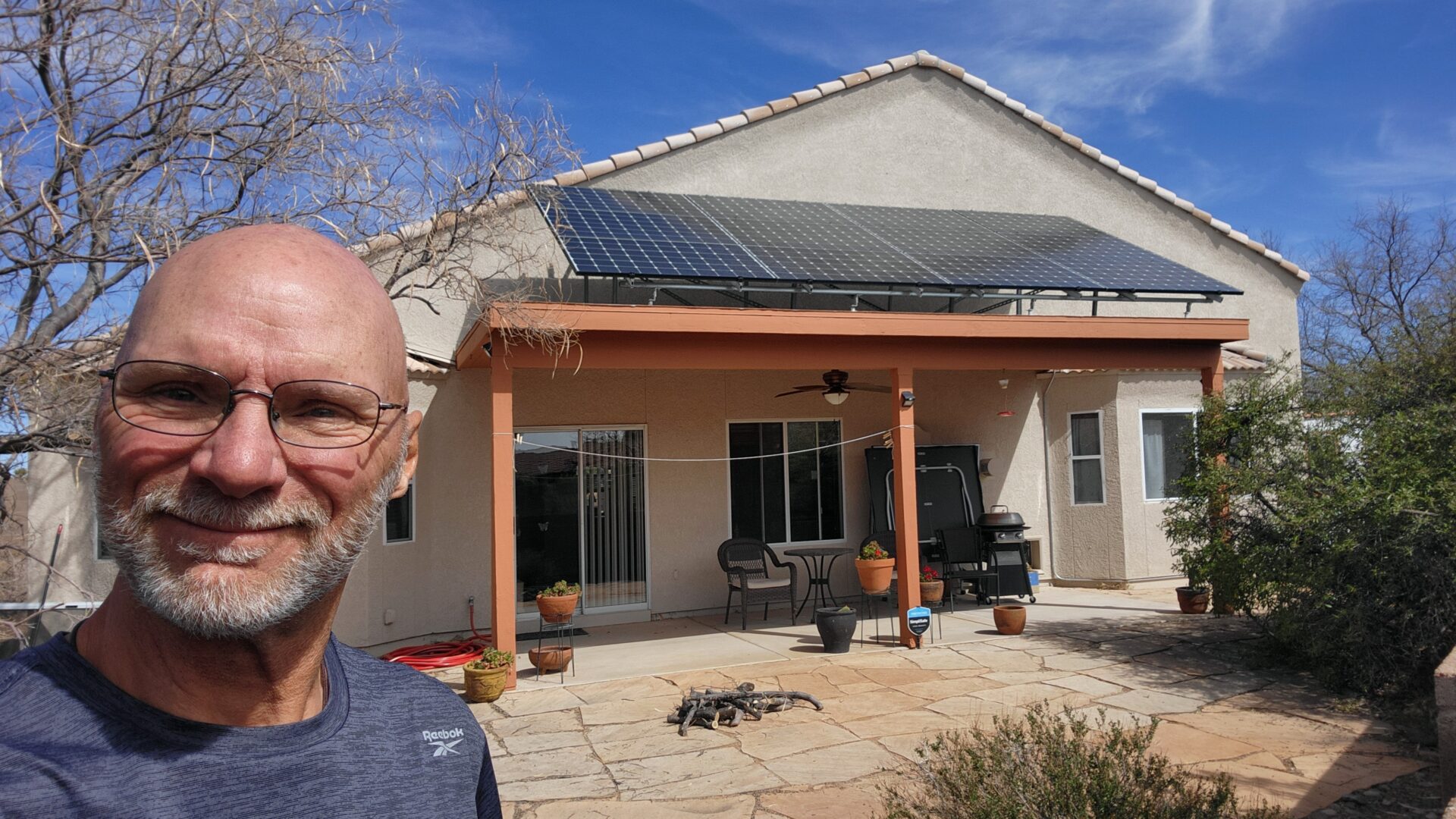Solar tax credit helps Arizona homeowner double down on solar
- IRA,
- Stories

Sierra Vista, Arizona, enjoys more than 300 sunny days per year. When realtor Patrick Murphy moved to the small Cochise County city in the spring of 2019, the abundant sunshine was a key factor in his decision. It offered ample opportunity for outdoor recreation and solar energy generation.
Before relocating, Patrick had been a solar homeowner and grown accustomed to the satisfaction of powering his home with renewable energy produced onsite. He began the process of going solar soon after settling in because he didn’t want to buy all of his electricity from his utility. “This is Arizona, why wouldn’t you try this?” said Patrick, on his desire to capitalize on the state’s most plentiful natural resource. With a clear understanding of his new home’s suitability for solar and how he could reduce his upfront investment through federal incentives, he installed a 5.5-kilowatt solar system in the fall of 2019.
“I love the independence of having your own power,” said Patrick. That independence was secured with help from the residential solar tax credit (Section 25D of the Investment Tax Credit or ITC). The ITC allows homeowners like Patrick to deduct a portion of the cost of their system from their federal income taxes. In 2019, when Patrick completed his installation, homeowners could deduct up to 30% of that cost. The following year, the tax credit began to phase out, dropping to 26% in 2020 and 22% in 2022. The credit was set to expire in 2023, but federal legislation passed in 2022 restored the 30% credit and extended it for ten years. “A tax credit to that degree is extremely helpful,” said Patrick, who lowered his cost to go solar by nearly $7,000 through the incentive. “That tax benefit came in real money the next year. I mean, that was literally taken right off what we owed.”
The system was designed to cover about 95% of his electricity needs. Before going solar, his energy bills averaged $125 per month. Now, they seldom top $10. In the six years he’s been generating electricity, Patrick has saved $9,000 in electricity costs he would have otherwise paid to the utility company. These monthly savings, combined with the upfront reduction in cost through the tax credit, will allow Patrick to shorten his payback time by about four years. “Every month when you have got that extra money that would have gone toward the power bill and toward the power company, it is going toward you and helping you retire and helping you build an asset,” he shared.
The ITC is crucial to making solar energy more affordable and accessible for American families and businesses. This program offers meaningful financial benefits to Arizonans like Patrick, yet solar opponents in Congress are seeking to eliminate it. Repealing these investments will mean higher energy costs for households and small businesses.
Despite efforts to overturn the program, solar continues to enjoy widespread support from majorities of Republicans, Democrats, and Independents. As Patrick puts it, “There is a varied type of person that would like to save money on their everyday bills … If you ask anyone, ‘Would you like to save 90% or 95% of your electric bill every month?’ most people are going to [say yes].”
As a now-established resident of Arizona, Patrick hopes to see his corner of the state continue to embrace solar and for his elected officials to fight to protect cost-saving incentives. “I would just say to my elected officials that this is a good way to go for society,” he implored. “I would love for my community and for the United States to be [even more] solar-friendly.”
Patrick went solar to align his energy use with his values, reduce monthly costs, and build equity in a distributed renewable energy system. Even if others have different priorities, he encourages them to take a second look “People don’t understand how nice it feels when you get solar installed and you turn something on and you realize the sun is giving [you] the electricity … It gives you a very good feeling of satisfaction, I will say, to have your own collection system,” he reflected.
“I would just recommend [to] people who think they have their mind made up against it to maybe just look into it a little bit more as far as what it can do for them and their family almost immediately upon installation.” Protecting the federal incentives currently on the chopping block will be crucial if Patrick’s neighbors and fellow Arizonans are to realize those benefits.
Act Now: Urge Congress to protect solar energy tax credits for all Americans
Solar energy is garnering support from both sides of the aisle. You can help keep up the momentum by making it loud and clear to your Senators and Representatives that Americans support federal solar investments.
Some members in Congress want to repeal successful policies that have made going solar more affordable for American families and businesses. Please use the form on this page to tell your federal representatives that you support smart investments, like the 30% solar tax credit.
Personalize your message!
If you have solar, explain how it is lowering and controlling your household’s energy costs. If you don’t yet have solar, tell them how these investments will make solar accessible for people like you.
Get the latest on solar straight to your inbox.
Fight for your solar rights.
Everyone has the right to go solar. Spread the sunshine nationwide and in your local community by taking action, joining events, and more.